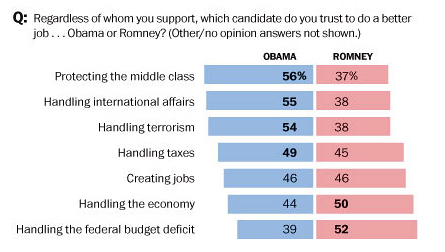For the better part of two years, Mitt Romney has been relentless. “Four years ago, candidate Obama came to Nevada, promising to help,” he said in his victory speech after the Nevada caucuses on Saturday night. “Today, Nevada unemployment is over 12%, home values have plummeted, and Nevada’s foreclosure rate is the highest in the nation … Well, Mr. President, Nevada has had enough of your kind of help.” Swap out Nevada for another state, and perhaps some different metrics, and you get what Romney has told countless Republican crowds across the country. The impetus for his candidacy is simple: the economy is bad, so is Obama, and Mitt Romney is the guy with solutions to both problems. So what happens if the economy gets better?
The question’s not so far-fetched. Personal income is up, joblessness is down. The economy is far from a full recovery — prerecession unemployment levels of 4% or 5% could be a decade away or more — but things are getting better, faster; in presidential elections the direction that the economy is heading is much more important than the numbers themselves. And despite Romney’s superhuman adherence to his Obama-as-economic-bugbear narrative, the possibility of sunnier days has not escaped the Republican candidate. In fact, it was once a given for his campaign.
(MORE: Romney Rolls in Nevada)
“I think President Obama will be difficult to beat in 2012, because I think an incumbent has extraordinary advantages,” Romney said in 2010. “He will do everything he can to get the economy going back again, and most likely — at least in my view — the economy will be coming back.” He continued: “Recessions do end. The economy recovers. It always has. It always will.”
This early stage of Romney’s proto-campaign was marked by a focus not on the domestic economy but on foreign policy. No Apology, the title of Romney’s pre-presidential memoir, wasn’t just an attempt to shrug off charges of political cravenness that dogged him in 2008. The subtitle read The Case for American Greatness, and the book fronted an attack on Obama’s allegedly weak (and fictionally apologetic) foreign policy. As the recovery stalled and Obama kept crossing off bigger and bigger names from the al-Qaeda wanted list, this path became less tenable, and Romney, who had never abandoned an economic message altogether, began to shift more of his time and energy into his domestic argument.
(PHOTOS: Political Pictures of the Week)
So, if the pace of the recovery quickens, will Romney return to his crusade against Obama’s foreign policy? It doesn’t seem too likely. According to a new Washington Post/ABC News survey, international affairs and terrorism are two areas in which significantly more Americans trust Obama than Romney.
One of the few major foreign policy events that could radically alter this dynamic would be in essence an economic one — a European financial crisis, which would almost certainly be accompanied by economic backsliding in the U.S. Barring unforeseen catastrophe, that leaves instability in Afghanistan, Pakistan, Iraq, Libya, Syria or North Korea, and Iranian aggression, as well as Israeli pre-emption thereof, as potential catalysts for foreign policy angst. But Obama hasn’t left much room to his right on many of these issues — see Monday’s announcement of another round of sanctions against Tehran — and it’s not a given that Romney would be well positioned to criticize Obama’s stewardship of such events.
The federal budget deficit might make for more fertile ground. The Post poll found that it was the issue on which Americans give the most credit to Romney over Obama, and it’s certainly an issue liable to stir the Republican base. But this has its own potential problems: discussion of income inequality and taxes has displaced much of the political debate over deficits, despite its dominance of the political realm for most of 2011. In December, Gallup found that only 12% of Americans ranked the federal budget deficit as their top concern. This could change as the recovery picks up and economic concerns abate, but it’s hard to say.
Back in 2010, during the same speech in which he predicted that the economy would improve, Romney previewed what his case against Obama might look like. “I think, however, that the American people have established a perspective on the President which is going to be lasting — that he has not understood the nature of America, in some respects,” he said. “That the values I’ve described of love of liberty, of freedom, of opportunity, of small government — that those values he doesn’t share.”
This is pretty thin gruel, and it’s of the same variety that Obama recently dished out in his State of the Union address with his promise to “reclaim American values” of fairness (and invoking, of all things, the unity of Navy SEALs targeting Osama bin Laden). But without a strong economic case to make, be it for Obama or against him, that’s what these men are left with. The fact is that Romney will probably continue to talk about the economy no matter what happens. His chances, and Obama’s, hinge more on the realities of the recovery than any campaign narrative. If the economy falters, Romney’s message and his candidacy will have a very good chance to break through. If the recovery roars to life, they probably won’t.

